by Rob Taylor Jr.
Courier Staff Writer
“Sunny and 65,” the perfect spring day in Pittsburgh on Monday, April 19. Reverend Michael A. Day, pastor of Legacy International Worship Center on the North Side, wished he was speaking before all the local media “to talk about an amazing program or project that’s happening on the North Side,” to rival the excellent weather conditions.
Instead, he and other community leaders and city officials were on the North Side to tackle a serious problem that’s causing nothing but heartache, heartbreak, and fear—an eye-popping surge in gun violence and homicides.
“I’m not only a community leader, not only a pastor, but I am a relative to the two who were lost last week,” Rev. Day said, referring to Tyjuan Malachi and Kenneth Hairston, two 18-year-olds who were his younger cousins. Malachi was killed in Northview Heights; Hairston was killed in Sheraden.
Four additional homicides have occurred within city limits since April 3, and Pittsburgh Police said that as of April 19, there have been 20 homicides this year, an 80 percent increase from the same period last year. The nearly 50 non-fatal shootings so far this year is a 90 percent increase from the same period last year.
The New Pittsburgh Courier regularly tracks homicide totals within Pittsburgh and Allegheny County, and found that there were 30 homicides in the first three months of 2021 in the county; 10 more than the first three months of 2020.
Particularly alarming to everyone are the teens being shot and killed. 18-year-old Ahmir Tuli, who had graduated from North Hills High School, was killed outside of his mother’s restaurant, Preeti’s Pitt, in the Strip District, on Feb. 22. 15-year-old Donangelo Castaphney, who was a sophomore at Allderdice High School, was killed in Lincoln-Lemington on April 13. On Saturday evening, April 17, two teens, names unknown as of press deadline, were shot in Marshall-Shadeland; one of the teens died.
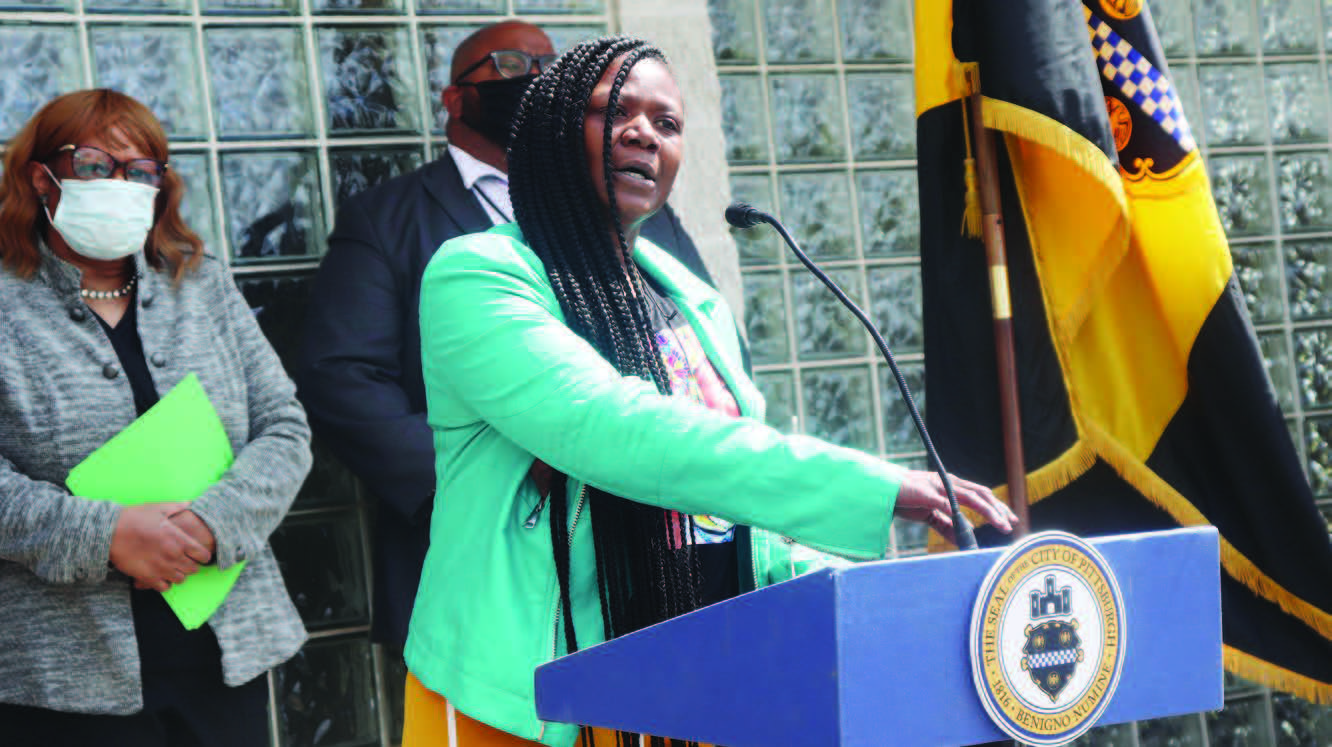
TIFFANY SIMPSON, who is actively engaged with Northview Heights residents, wants to see more educational opportunities and recreational centers for the youth. (Photos by Courier photographer Rob Taylor Jr.)
“Every time one of these children dies, our legacy goes,” said Tiffany Simpson, with the organization Conscious Women in Control of the Community. “That’s a doctor, a lawyer, a politician…”
In recent days, a man was found shot inside Lady Di’s Lounge on the East Hills/Homewood border, a person was shot in Garfield, a shooting victim was found in the Hill District, and three people were shot following a birthday party in Knoxville; one of the men died.
There have been press conferences in prior months and years to call for an end to the violence, much of which affects the county’s African American communities. But on this day, there was a larger-than-normal crowd that filled the parking lot of Project Destiny, Inc., at 2200 California Ave., North Side, where founder and executive director Rev. Brenda Gregg has provided a safe place for youth and families for years.
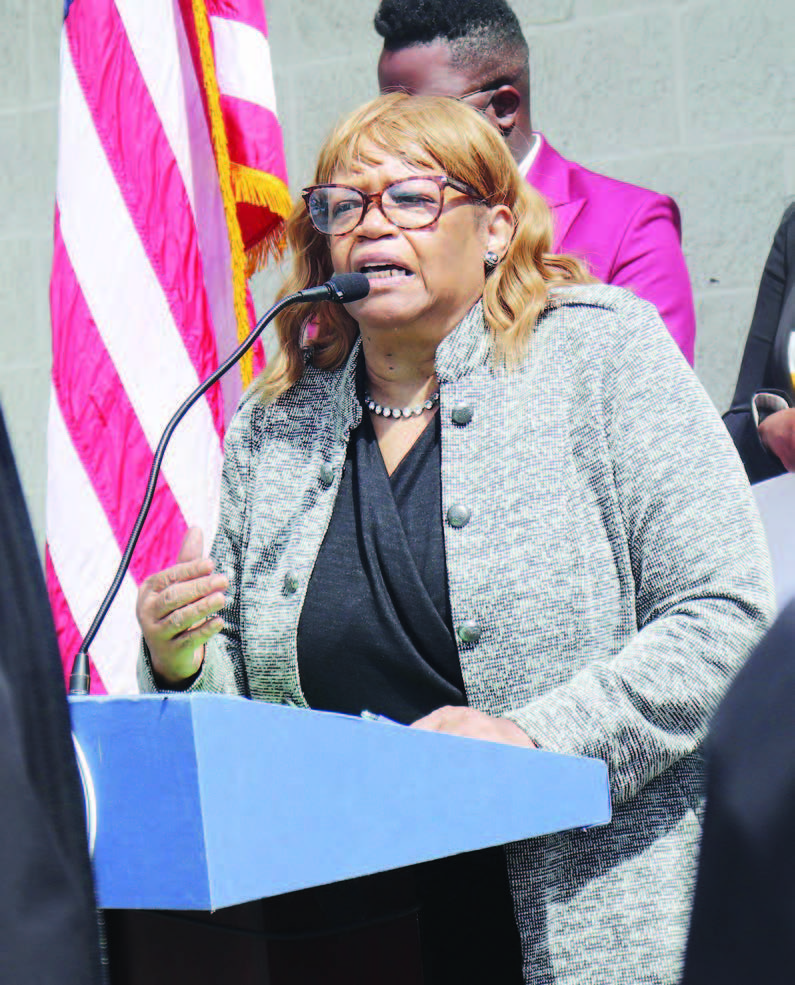
REVEREND BRENDA GREGG, founder and executive director of Project Destiny, Inc., where the April 19 press conference was held. Project Destiny’s address is 2200 California Ave.
Reverend Gregg spoke at the podium, as did Rev. Cornell Jones, coordinator of the city’s Group Violence Intervention program. Shatara Murphy, the city’s Public Safety Assistant Director for Community Affairs, and Pittsburgh Mayor Bill Peduto also addressed the media in a collective call for “love, not hate.”
In clear view just off to the side of the podium were representatives from numerous “boots-on-the-ground” community organizations working daily to combat the violence —Center for Victims of Violence and Crime, The Reach Initiative, Operation Better Block, South Pittsburgh Peacemakers, Pittsburgh Outreach, The Neighborhood Resilience Program, MAD DADS, Pittsburgh Housing Authority, and individuals working with residents in Northview Heights, like Simpson.
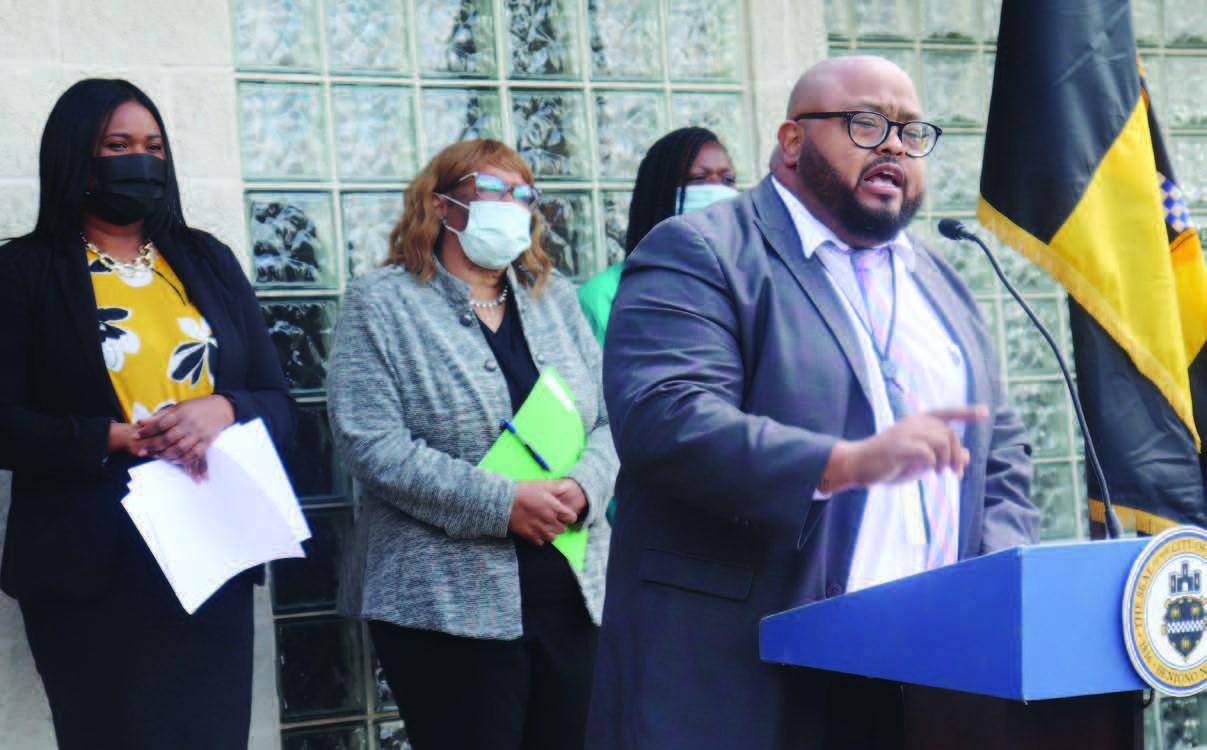
REVEREND CORNELL JONES, Pittsburgh’s Group Violence Intervention coordinator, speaks during an April 19 press conference held outside Project Destiny, Inc., on California Avenue on the North Side. (Photos by Courier photographer Rob Taylor Jr.)
“Know what your child is doing,” Simpson said at the press conference, directed at parents across the city, and particularly in her Northview Heights community. “Understand that you are the parent. The streets is going to be its own parent. I understand we have to work to survive, however, know what your child is doing.”
Simpson, 47, who graduated from Cheyney University, said she is active in Northview Heights because she wanted to show younger people that “you can go and get an education, and then come back and give to your community.”
She told the media she’s come to realize that the youth don’t have recreational centers in Northview, “the schools have been closed,” and the youth aren’t being given an opportunity to learn things like the stock market, or Bitcoin. Bitcoin is a type of cryptocurrency which can be used to make online purchases, as well as being bought in bulk as an investment, hoping its value will grow.
These types of new learning opportunities, Simpson said, will give youth the freedom to “have something else to do, other than hate.”
Simpson’s comments were part of the speakers’ collective declaration— the violence that’s plaguing the primarily-African American communities can only be solved by the entire community; parents, mentors, youth coaches, faith-based organizations, community organizations, nonprofit organizations, police, educational institutions and corporate entities. Mayor Peduto was adamant about Pittsburgh’s corporations getting involved.
“I’m calling on our corporate leaders to understand that if you want to take a gun out of a young kid’s hands, give him a job in the summer,” the mayor said, to applause from community leaders. “Give him the opportunity to see what it’s like to work at a bank or at a hospital. Invest back into the neighborhoods, and into the leaders that are actually out there doing the work. We are not going to solve this by just putting more police officers on the streets. This is solved by giving people opportunities; opportunities that they do not have right now.”
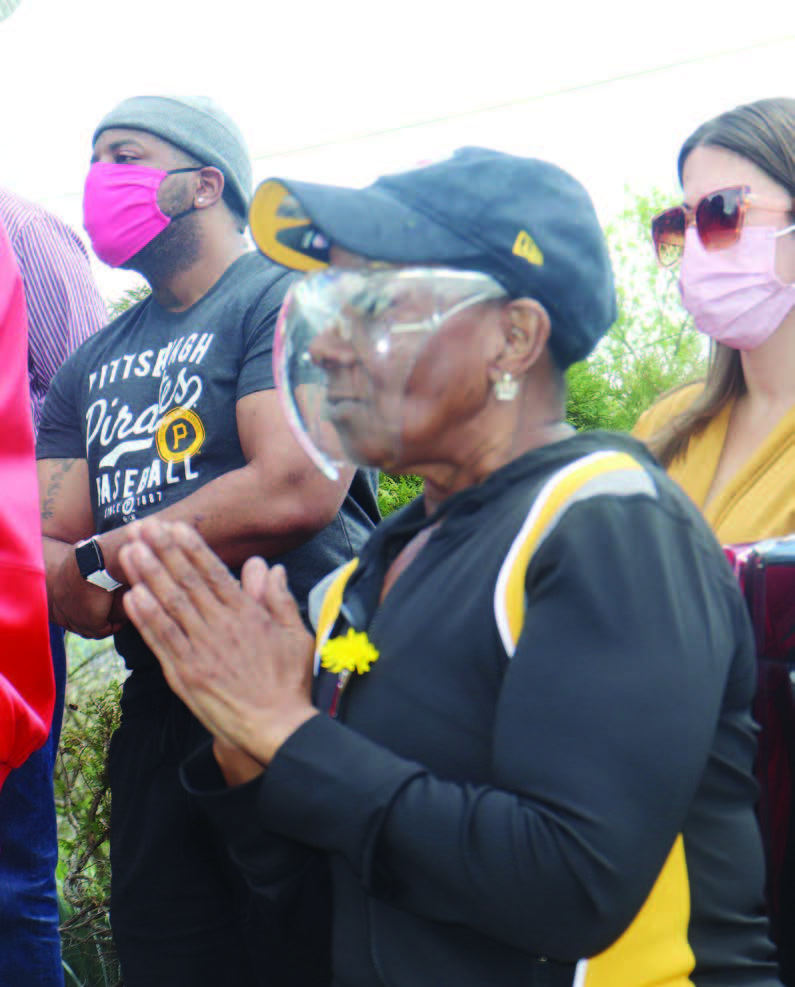
MAXINE SIMPSON, among those at the press conference on the North Side, April 19, urging a stop to the violence in Pittsburgh. There have been 20 homicides recorded in the city already this year.
In general, Pittsburgh averages 50-60 homicides per year, with another 50 or so occurring in municipalities outside of Pittsburgh but within Allegheny County. The city lauded the efforts of its police force and community organizations when the homicide count dropped to 37 in 2019, but in 2020, when the coronavirus pandemic took hold, the homicides increased that year to 51. Pittsburgh is on a current rate to have 66 homicides in 2021, which would be the highest number since 71 homicides were recorded in 2014. Is the increase this year also due, in part, to the pandemic? Or something else? Reverend Day, in his tell-it-like-it-is approach, wasn’t about to blame the homicide increase solely on COVID.
“We are in a pandemic within a pandemic,” Rev. Day said. “Coronavirus is just an extension of the trauma that our community has been in for years, for generations.”
Reverend Day said he’s appreciative of the countless programs, scholarships and athletic outlets that have benefited Black youths over the decades. But through it all, the violence continues. Reverend Day believes the best way to truly make a dent in the acts of violence is to provide youth with a “leadership” mindset.
“I know a lot of awesome athletes in prison. I know a lot of college graduates that went to prison for fraud because they were so smart,” Rev. Day said. “Leadership changes perspectives and mindsets. If we could build leadership in these young kids’ minds, they will then have the confidence to know they are a leader. When they are taught to be a leader, their decision-making changes.”
Pittsburgh Police Chief Scott Schubert, who was present at the April 19 press conference, said in a statement earlier in the day that “the Pittsburgh Bureau of Police will not allow this senseless loss of life to continue. Our officers will work directly with the community to get to the root cause of these crimes and stop them from occurring.”
More officers will be seen patrolling the areas seeing the most violent criminal activity. Other officers will be walking neighborhood streets in an attempt to forge better relationships with the city’s residents. Reverend Jones, the city’s Group Violence Intervention coordinator, said his team will continue its mission —attempting to stop violent incidents before they happen with strategic, targeted intervention. However, Rev. Jones, just like the other speakers, said that it’s going to take “the village to save the village.”
Reverend Jones added: “It goes from sitting on the sideline to now getting in the game. Find your role…I’m tired of burying babies, burying geniuses. The blood is on our hands if we don’t do what we’ve been called to do.”
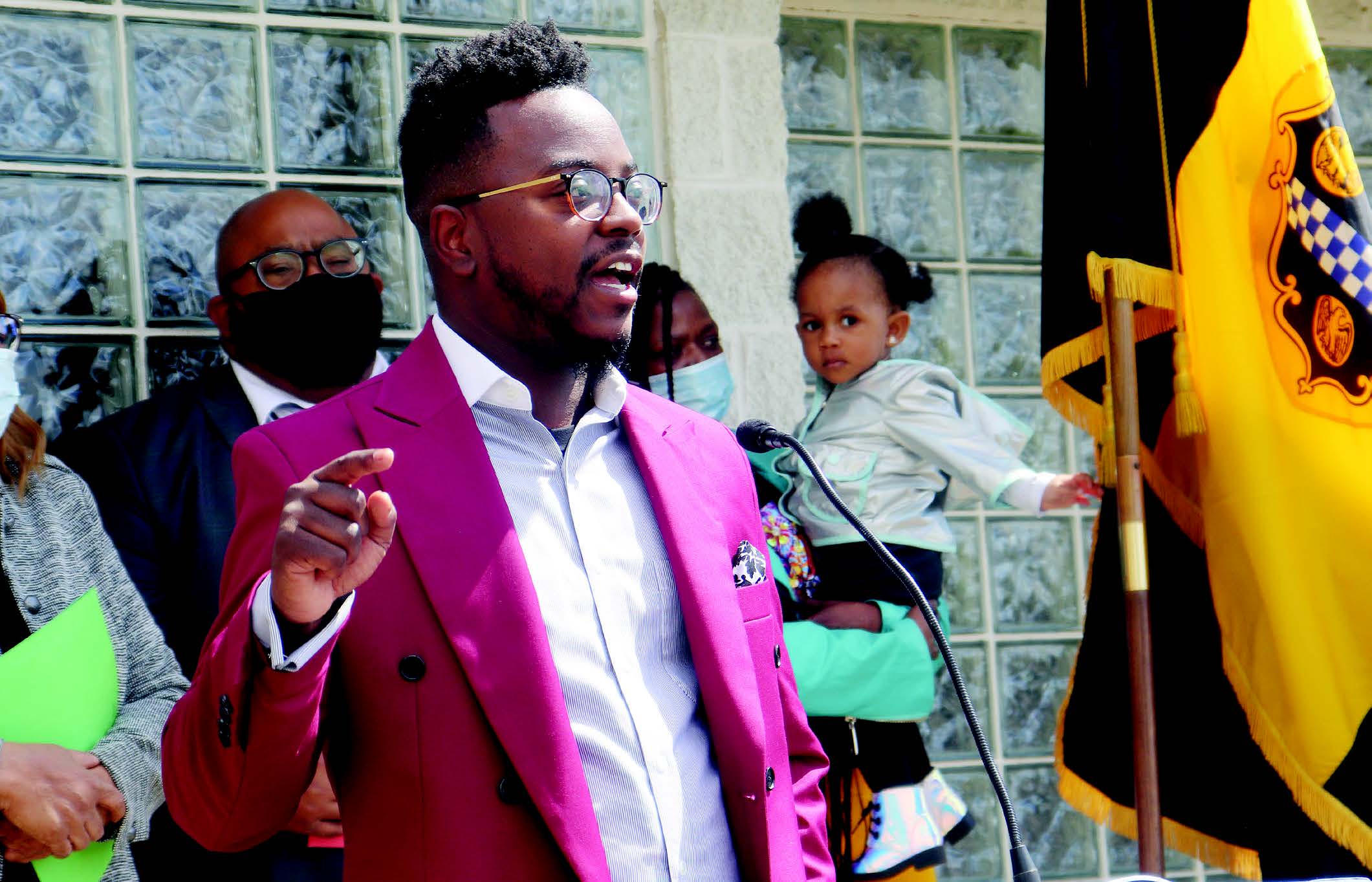
REVEREND MICHAEL A DAY, pastor of Legacy International Worship Center on the North Side, speaks during an April 19 press conference asking for everyone to come together to stop the recent spike of homicides that have been occurring in Pittsburgh. Among those watching is 1-year-old Nhoa, being held by Tiffany Simpson. (Photo by Rob Taylor Jr.)